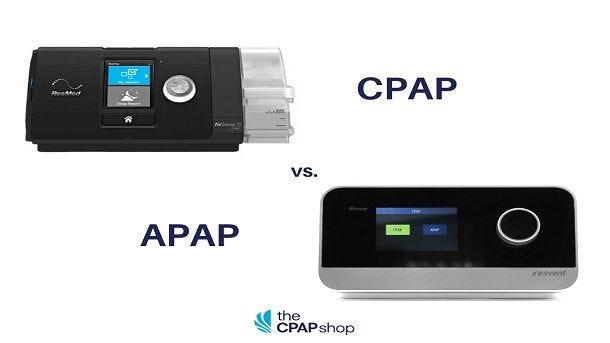APAP vs CPAP - What is The Difference?
Most times, when patients are diagnosed with sleep apnea, the main form of treatment recommended by their doctor is continuous positive airway pressure (CPAP). CPAP therapy helps users breathe better by delivering constant and steady air pressure to help them breathe while they sleep. CPAP therapy is produced by attaching a CPAP mask to a CPAP machine to deliver the air from the machine to your nose and/or mouth.
However, there are alternatives to CPAP, one being Automatic Positive Airway Pressure (APAP). This is prescribed to users when they cannot tolerate regular CPAP and offers a variety of air pressure ranges that auto-adjust to the user's breathing. Treatment is relatively the same, using a CPAP mask and machine to deliver and adjust to the minimum pressure needed, as prescribed by your doctor.
What Should You Expect For Your First Night on Auto PAP?
It is necessary to understand that an AutoPAP will typically start at a lower pressure than what the actual asleep pressure will be once the person enters sleep As the patient falls into a deep sleep, the AutoPAP will automatically adjust during apnea to keep the airways open. It also may increase pressure due to any number of reasons, including shifting sleep positions, having some cocktails, seasonal allergies, or even a runny nose. If a patient wakes up during this time, he or she will notice a difference and maybe be startled. The machine is doing its job, but the patient may need some time to acclimate to this fluctuation in pressure. The key point is that an AutoPAP works when you are sleeping and remains at low pressure when you are awake. Thus, it provides for a more natural breathing experience with less exhalation resistance throughout the night.
How Long Does it Take to Adjust to Auto CPAP Therapy?
It usually takes anywhere from one week to one month to acclimate to AutoPAP. Unfortunately, many patients give up before they give themselves enough to adjust to the changes. As a PAP user myself, I tell patients that the first few weeks are more of a mental game and they have to stay focused on the end result of a better life with fewer symptoms.
CPAP Machine vs APAP Machine - Major Differences and Comparison
| APAP (Automatic Positive Air Pressure) | CPAP (Continuous Positive Air Pressure) | |
| Applications | - use for a minimum of 6 hours per night - lightweight, quiet operation to not disturb the user or their bed partner - wear a mask that is connected to an APAP machine to deliver pressurized air through your mouth | - use for a minimum of 6 hours per night - lightweight, quiet operation to not disturb the user or their bed partner - wear a mask that is connected to a CPAP machine to deliver pressurized air through your mouth |
| Availability | - becoming more popular as an alternative treatment to CPAP | - widely available and easy to obtain |
| Success Rate | - shown to have best results in users that have trouble sleeping or move around a lot | - most common way to have positive results when being used consistently |
| Unique Advantages | - helps clear congestion and reduce swelling | - can potentially clear out congestion - may reduce swelling in the nose and throat |
| Disadvantages | - can cause irritation or marks on the skin - inside the nose, mouth, and throat may feel dry - doesn't respond to all types of sleep apnea | - can cause irritation or marks on the skin - inside the nose, mouth, and throat may feel dry |
| Recommended For | - patients who find regular CPAP therapy uncomfortable - patients who have a specific form of sleep apnea that a doctor prescribes | - patients who have sleep apnea, specifically obstructive sleep apnea - patients who have disrupted sleep because of their condition |
| Not Recommended For | - users who cannot wear a CPAP mask while sleeping - users with CSA, COPD, congestive heart failure, or apnea caused by opioid use | - users who cannot wear a CPAP mask while sleeping |
CPAP vs APAP - Which is Better For You?
It's important to first consult with your physician about which machine would be right for you. They will have your diagnosis to determine which type of machine will be better to suit your needs. Most people will start with a CPAP machine since that is the most common form of treatment. However, if CPAP is not giving a user the proper results, a doctor may then prescribe you APAP instead. If you feel as if you are not getting the proper treatment, talk to your doctor for further steps.
Where Can I Buy CPAP and APAP Machines and Equipment?
You can shop for both CPAP and APAP machines at The CPAP Shop. We offer an extensive line of products that will suit every user's needs. Our knowledgeable staff is ready to help you pick products for successful CPAP therapy. Give us a call at 866-414-9700.




